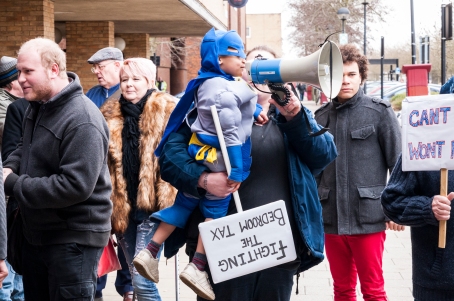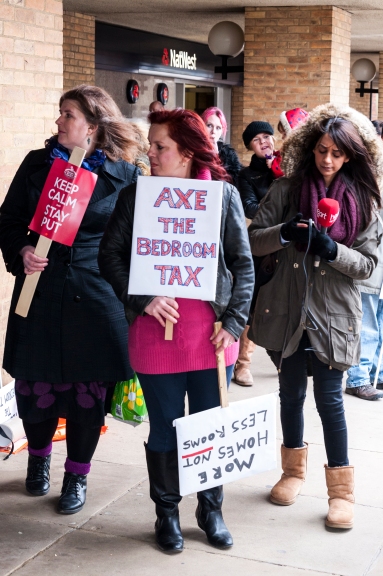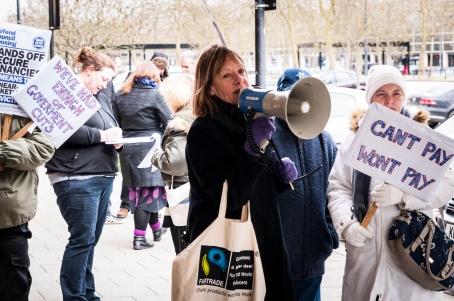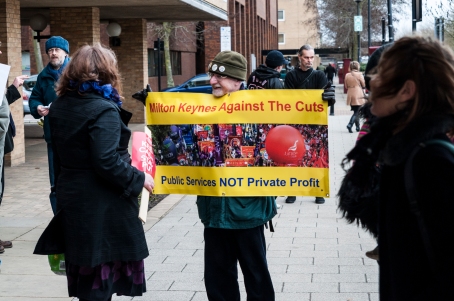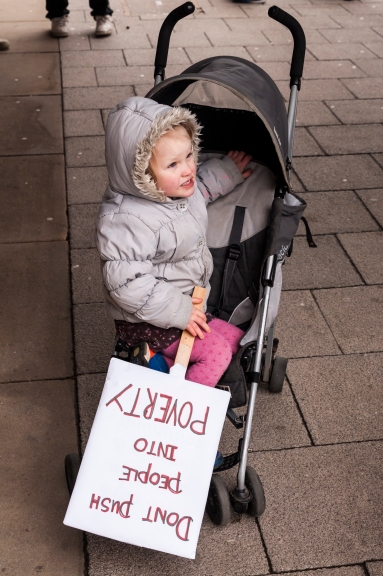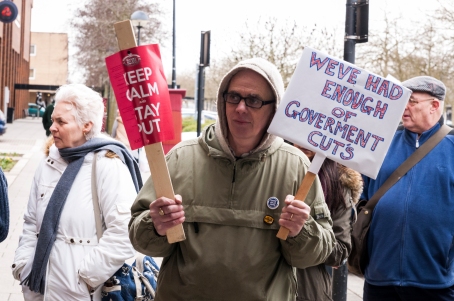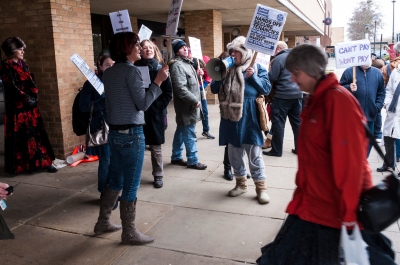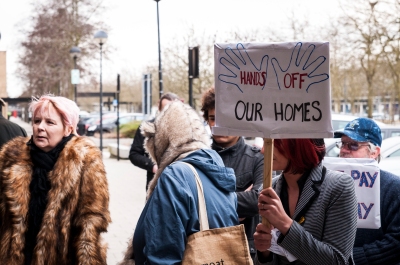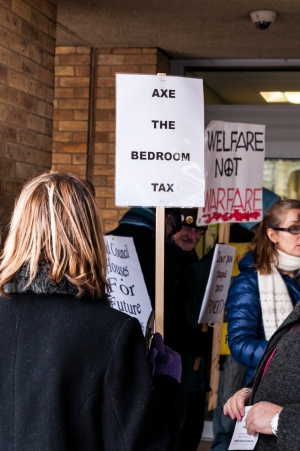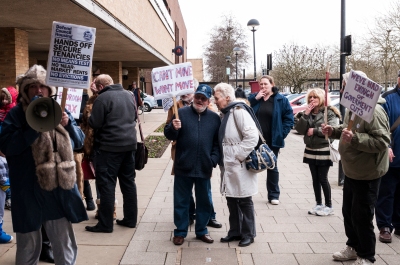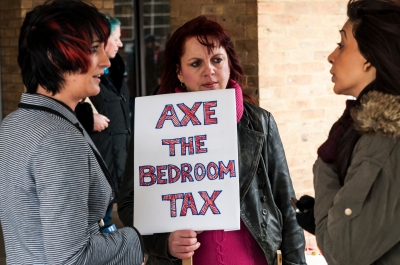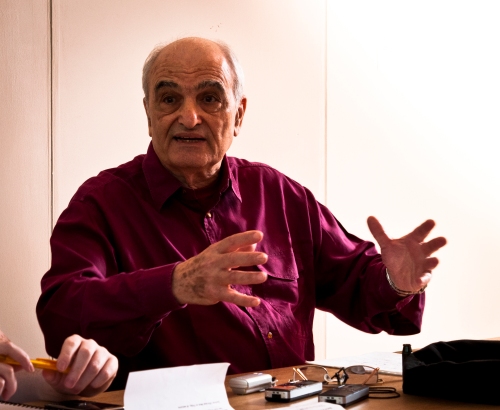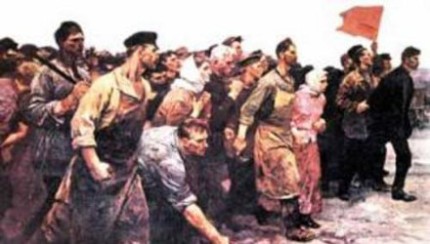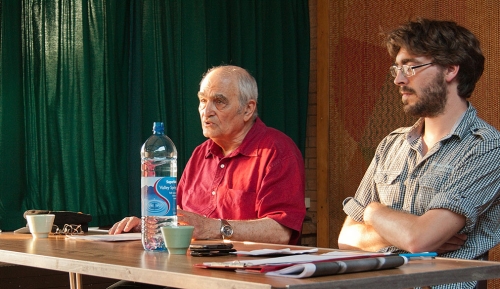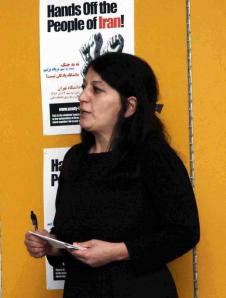The call for a general strike to bring down the government is out of place, writes Mike Macnair
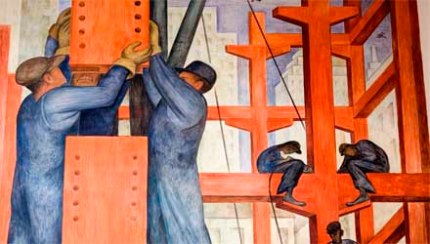
The bulk of the far left sees the TUC October 20 demonstration against austerity as an opportunity to carry on an agitation for a general strike to bring down the government.
Socialist Worker headlines this week: “Out! Out! Out!” The accompanying text argues for a general strike and further escalation. “The magnificent strike on November 30 last year gave a glimpse of the power workers have, when taking mass action together. Strikes like this can drive the Tories into submission.”1
Last week’s headline in The Socialist read: “Kick out the ‘nasty party’!” The accompanying text claims (as the Socialist Workers Party has also claimed on other occasions) that “This is a weak government that we can kick out … The call for a general strike received huge support at the recent demonstration outside Tory conference.”2 (The Socialist says that the size of this demonstration was “thousands”; Indymedia reports 5,000, a lot smaller than the 30,000 or more who demonstrated in Manchester in 2011.3)
Socialist Resistance has published online its leaflet for October 20. “Step up the struggle! Strike against austerity!” are the opening headlines. But at least the leaflet flags up the party question in some way: “Demonstrations and strikes are absolutely necessary to stop austerity, as well as a massive and united movement of resistance. But we also need a political solution to our struggle so that we can have in government a party, like Syriza, which will reverse austerity …”4
Articles in the Alliance for Workers’ Liberty’s Solidarity do not display a consistent view. Martin Thomas’s introduction to the AWL’s coming conference is appropriately sober on perspectives:
On one level, unresolved capitalist crisis, which means continued depression at a global level and a high possibility of further economic dramas: for example, in the euro zone. In Britain working class conditions are being squeezed deeper and longer than in the 1930s or under Thatcher.
All that makes upheavals likely before long. Maybe not mass strike waves, which are more likely to come with some economic recovery than in the depths of the slump; but explosive local industrial struggles, street protests, and ‘molecular’ radicalisation of individuals.
On another level, Britain now has a period of working class lull following the setback on pensions on December 19 2011, which with each passing month becomes more like an outright defeat.
We cannot end the lull at will …5
On the other hand, Daniel Randall and Sacha Ismail offer ‘A workers’ plan to beat cuts’, which is in substance a general ‘action programme’ (a shortened and immediatised version of a party programme). After the introduction, it begins with:
No cuts to jobs and services: we need a massive campaign of industrial and political action against the cuts, starting now, not at some point in the future after the TUC demo.
Struggles must be fought around clear demands, and fought to win – not simply to express displeasure at some already-taken action of the bosses or government.
This is a slightly less explicit version of the ‘general strike now’ line of the SWP and Socialist Party in England and Wales.
It ends, as such programmes usually do, with “Fight for a workers’ government”. The formulations are muddled, but I am not concerned to criticise them here. The point is that the whole structure of the action programme, the ‘plan to beat the cuts’, supposes that the struggle is likely in the near future to escalate to the point of putting on the agenda the question of government – not in the sense of an early general election and handover of office to the Labour right, but in the sense of a left government, one which “could only take power on the back of struggles so wide-ranging that they would shake up (and, in all likelihood, break up) the current Labour Party to such a degree as to render it unrecognisable”.6
The Anti-Capitalist Initiative website has two articles by the same author, on the same day – John Bowman, October 14 – which are similarly schizoid. ‘After the march – will the TUC step up the action?’ is conventional general-strikism: “A one-day strike is ultimately a protest. It would need to be turned into sustained mass strike action to stop the cuts, and defeat a government that is determined to destroy the welfare state …”7 The piece headed ‘What should the TUC do?’ recommends a much more low-level set of policies to rebuild the trade union movement, but ends with “time to start matching fighting talk with real action that can win”.8
An awful lot of these far-left lines are written as if we were in the year 1974 – after the second miners’ strike had brought down Heath, and before the labour law ‘reforms’ of Wilson and Callaghan had succeeded in undermining the shop stewards’ movement – let alone, before Thatcher’s decimation of British manufacturing industry, the extensive robotisation of much that remains, the defeat of the 1984-85 miners’ strike and all that has followed it.
Where we are now is not on the verge of a revolutionary crisis. The task we face is not the immediate struggle to bring down the government, but to rebuild the workers’ movement. Strikes, including one-day protest general strikes, have a real place in that task. Slogans or strategies of a ‘general strike to bring down the government’ are right now simply unrealistic.
Where are we now?
To begin with the positive: ‘Marx is back’. The crash of 2008 and its long-drawn-out consequences have meant that the tendency of capitalism periodically to threaten the foundations of its own existence is back on the political agenda. This is one of the distinctive predictions of Marx’s critique of political economy, and it has meant that even the rigid control of the academic economics profession and of economic journalism by ‘neoclassical’ marginalists has not prevented a ‘Marx revival’.
I do not definitely say, as Martin Thomas does, that the capitalist crisis is ‘unresolved’. This may be true, but it may also turn out that enough of the losses have been externalised away from the ‘core countries’ through money-market mechanisms for there to be a new limited upturn or even a new bubble, on the basis of the extraordinary levels of money-printing that have gone on in the last period.
Secondly, the politics of class is back with a vengeance. Occupy Wall Street’s slogan against the 1% – the ruling class – resonated widely, even if the movement itself has largely withered, as all such spontaneist direct-action ‘spectacular’ projects do. Owen Jones’Chavs becomes an Amazon bestseller. Government chief whip Andrew Mitchell calling cops ‘plebs’ becomes, for a while, a political running sore. David Cameron finds it necessary to claim that he stands for “privilege for all” – a nonsensical slogan.
The Eurocommunist idea argued by the late Eric Hobsbawm and others, that issues of class are gradually being superseded by identity issues – gender, race, sexuality – as motivators of radical critique of the present order, has spectacularly proved itself false. Capital has shown in the last 20 years that it can be anti-racist, anti-sexist, etc, in its own way; what it cannot do is avoid waging war on labour.
The crisis and austerity accentuate the issue, since the Con-Dem government is determined not to waste the opportunity to push through attacks on welfare and privatisation of the health and education systems. The effect is an obviously corrupt government acting in the interests of its ‘1%’ paymasters at everyone else’s expense.
This context has necessarily produced a real, if as yet small, revival of militant collective action. Days lost through strikes rose in 2011 to the highest level for eight years. A large chunk of this was the one-day public sector action on November 30, but if this element of the 2011 figure is subtracted, there would still have been a rise in strikes.
Downside
On the other hand, if days lost through strikes have risen, they remain at historically low levels relative not only to the 1970s, but to any time since World War II. Union membership is around half where it stood in the 1970s. The level of organisation remains extremely weak: paradoxically, it is this weakness which has allowed the far left and militants linked to it to make gains in elections and conference resolutions in the official structures of the trade unions.
Since the 1980s, robotisation and so on have produced an extremely productive industrial sector, but one with a far smaller workforce (the natural result of increased productivity) dispersed in relatively small (in terms of numbers employed) workplaces. Large workforces and workplaces have become a feature mainly of the service sector and in particular of the public sector.
There has been a long-term trend away from full-time into part-time employment, which has been accelerated by the effects of the 2008 crash. In itself, this would be a good thing: communists favour shorter hours for each worker and on that basis work made available for all. But under capitalism, part-time working leads to impoverishment and welfare dependency. This is because the combination share of rent and mortgage interest in the social surplus product, the multiplication of competing financial ‘utility providers’ for gas, electricity and so on, and agricultural subsidy in the form of price maintenance and set-aside (the EU Common Agricultural Policy) elevates the cost of living relative to full-time wages; and it is considerably harder for part-time workers to organise collective action in the workplace than for full-time workers. Iain Duncan Smith’s massive attack on part-time workers’ benefit rights is about to kick in, with incalculable effects.
This is only one of a number of cuts and austerity measures which are either not yet introduced in practice or have yet to take their full effect. The result is that, though the Con-Dems have been talking down the economy and emphasising how bad everything is, the need for cuts, the ‘unsustainability’ of pensions, the welfare state and so on, Britain remains in economic stagnation. It is not – yet – in a real deflationary death spiral like Greece or, to a lesser extent, Spain.
Going along with this, although there is considerable hostility to the government’s cuts/austerity policy, this does not yet in any sense amount to a crisis of the political order. Polls show Labour under a rightwing leadership around 10% ahead of the Tories – normal in mid-term. The Tory vote at around 30% is holding up quite well. The Liberal Democrat showing at 9% is dramatically down on the party’s 2010 general election result, but not in complete collapse territory, given its regional distribution.9
As far as far-left electoral support is concerned, the Trade Unionist and Socialist Coalition (run by SPEW with the support of the RMT union leadership and the episodic participation of the SWP) has been able outside London to achieve results comparable with the middle to stronger end of far-left candidacies under the names of the Socialist Alliance in 2000-05 and by the SWP under its own name and the rival Socialist Unity in 1976-78. It has not got beyond this level and shows no sign of mobilising activists on the ground sufficiently to do so.
Beyond this is the absence of the vision of an alternative to the system of capital. Marx’s diagnosis of the ills of capitalism may be ‘back’, but the alternative – socialism – is still in the shadow of Stalinism. The organised far left constantly reminds the broad layer of activists of Stalinism through its own bureaucratic-centralist internal practice, which generates both unprincipled splits and the duplication of bureaucratically controlled front organisations, which fraudulently pretend to be broad ‘united fronts’: Counterfire’s Coalition of Resistance, the SWP’s Unite the Resistance, SPEW’s National Shop Stewards Network, and so on. The unorganised far-left ‘independents’ and the anarchists are if anything worse: quot homines tot sententiae– as many opinions as there are individuals – forming thousands of sects of one member.
This Stalinist shadow also results in the unwillingness of the far left to actually propose anything more than immediate minimum demands, plus utopian fantasies of Keynesian management of national capitalism, which are disproved by the ability of financial sanctions to destroy the domestic economies of – in recent decades – Iraq, Zimbabwe and Iran. That unwillingness is reflected not only in the policies proposed by the Labour left, by the Morning Star’s Communist Party of Britain, by the SWP, SPEW and AWL, but also in the electoral platforms of strong left parties like Syriza in Greece and the Socialist Party in the Netherlands. This shows that it is not only a matter of electoral weakness, but of an underlying failure of imagination – the inability to conceptualise an alternative other than Stalinism.
Given these weaknesses, how on earth could we imagine that the question of the working class taking political power is immediately posed, in a way which would make the idea of a general strike to bring down the government an appropriate agitational idea? The problem is to rebuild the workers’ movement into one capable of posing the question of power: which, at the moment, it is not – even in Greece.
Rebuilding
Rebuilding the workers’ movement is a long and not straightforward task.
At the core of any workers’ movement are the trade unions. However, militants think in ways which are obstacles to rebuilding. Those above the age of 50 grew up in a world very different from today’s – a world of large, concentrated workplaces of full-time workers, under full-employment conditions, in which shop-steward workplace militancy could build the union. They transmit their ideas to the younger generations.
But high unemployment has become endemic; and the trend to part-time working and smaller workplaces has made union organisation problematic except for limited groups like railworkers and prison officers. Trade unions must therefore look to organise the part-timers, the casuals, even the unemployed. To do so they need to shift away from their focus on workplace organisation to district organisation. They also need to increase their emphasis on the welfare and educational roles of trade unions, as the state withdraws from this field.
However, trade unions alone are not enough. The importance of cooperatives and mutuals in redeveloping the institutions and traditions of working class solidarity is increasing and will continue to increase in the modern conditions of retreat from full employment and welfarism.
These activities sound banal and unexciting by comparison with agitating for the general strike. But it is the steady, long-term, banal and unexciting activities which create the conditions for broad layers to imagine themselves, rather than the ruling class, running society; and hence for mass actions which do begin to pose the question of an alternative to capitalism.
Alongside these activities is the necessity of working class politicalaction. This is grasped in a one-sided way by Socialist Resistance with its call for “a party like Syriza”; and in another one-sided way byThe Socialist, for whom it just means ‘Build Tusc into a new Labour Party’; and in yet another and equally one-sided way by the AWL – comrades Randall and Ismail characterise Labour as “woefully inadequate” (not pro-capitalist, comrades?) and argue for “fighting to restore Labour Party democracy”.
Randall’s and Ismail’s action programme has the merit of containing some democratic demands: annual parliaments, a worker’s wage and an end to “the assault on basic democratic freedoms” in relation to kettling, policing and free speech. But if they have done better here than the pure advocates of the general strike, they fail to grasp that rebuilding the workers’ movement demands a parallel political offensive against the active intervention of the capitalists in and against this movement through the legitimacy of parliament, the capitalist monopoly control of the mass media, and the corrupt ‘free market in legal services’ judiciary.
It is this fight against capitalist political control which demands a workers’ political party and workers’ independent media as part of the process of rebuilding the movement. A party is not just an instrument for elections and seeking office in government. Rather, intervention in elections, especially round democratic issues, are means to delegitimate the electoral system – and hence the government’s claim to a ‘majority’ – the media and the judicial system.
This question, however, is interlocked with the problem of democracy in the workers’ movement. A trade union controlled by bureaucrats, a cooperative by managerial tops, a Labour Party or SWP controlled by its full-time staff demobilises the membership and tends to weaken its own organisation.
But political loyalty to the British nation-state and the parliamentary constitution is the core of Labourist politics, both among Labour leaders and trade union bureaucrats, left as well as right. This loyalism inherently implies a party reliant on the capitalist mass media and subservient to its bidding. And this in turn implies the regime of bureaucratic-centralist control, and a consequent demobilisation and weakening of the movement itself.
By making unity with the trade union tops or with ‘broad forces beyond Marxists’ the precondition for unity with the rest of the left, the SWP, SPEW and other advocates of this approach in fact commit themselves to not doing in an organised way the work of ‘scandalising’ the political institutions, which is essential if we are to rebuild the workers’ movement.
The underlying need is to rewin our movement to the idea of solidarity and cooperation of the working class as a class, and recreate the institutions and practices which express this idea. This is why actions like the October 20 demonstration, why coordinated walkouts and one-day protest general strikes are useful steps towards rebuilding: they assert the common class interests of the working class.
They would be more useful still if they were organised on a continental scale, to reassert the common interests of the working class as a class across Europe; and, for example, to rebuild the May Day festival worldwide, in order to reassert our common globalinterests.
But the best should not be the enemy of the good. We should undertake the task of rebuilding the movement both in its banal and local aspects and also in whatever inspiring demonstrations of solidarity we can manage. By doing so we will create the conditions in which the working class in future will be able to take its destiny into its own hands.
mike.macnair@weeklyworker.org.uk
Notes
1. Socialist Worker October 20.
2. The Socialist October 11-17.
3. www.indymedia.org.uk/en/2012/10/501166.html.
4. http://socialistresistance.org/4047/strike-against-austerity-leaflet-for-download.
5. www.workersliberty.org/story/2012/10/17/getting-ready-upheavals.
6. www.workersliberty.org/story/2012/10/17/workers-plan-beat-cuts.
7. http://anticapitalists.org/2012/10/14/after-october-20-tuc.
8. http://anticapitalists.org/2012/10/14/what-should-the-tuc-do.
9. http://ukpollingreport.co.uk.







